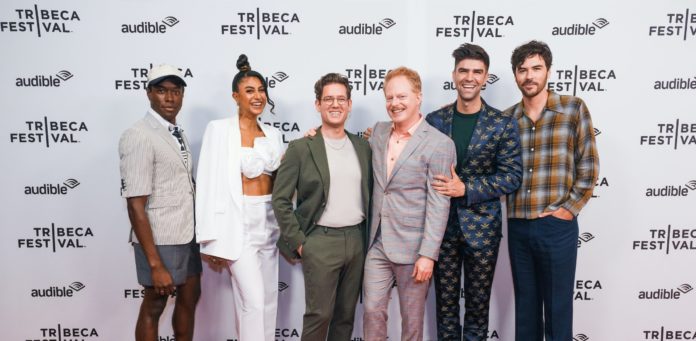
The cast and crew of Gay Pride & Prejudice (L-R Ronald Peet, Vella Lovell, Zackary Grady, Jesse Tyler Ferguson, Justin Mikita, Blake Lee) on the red carpet ahead of their Tribeca Film Festival Panel: “A Romantic Comedy Event: Gay Pride and Prejudice.”
Few writers have made their mark on the literary canon quite like Jane Austen. Pride and Prejudice—her saga of courtship, candor, class, and, ultimately, love and marriage—has been the subject of much adaptation, interpretation, and admiration since its 1813 publication. It’s a personal favorite of playwright Zackary Grady, who, after the 2015 U.S. Supreme Court ruling in favor of gay marriage, set out to work on a script for a queer, modern stage adaptation. Around the start of the pandemic, his idea transitioned from one on the stage to a fully auditory performance—spurring the new fiction podcast Gay Pride & Prejudice.
The Spotify Original podcast and Gimlet production follows Bennet, a 30-something gay man navigating dating and avoiding commitment in Boston, over the course of a year. The 10-episode saga—chapters run approximately 20 minutes each—stars Blake Lee as Bennet; Ronald Peet as a brooding, ex-football-playing Darcy; Tony Award–winner Jesse Tyler Ferguson as Colin; and Crazy Ex-Girlfriend’s Vella Lovell as Charlotte. Jesse is also an executive producer alongside her husband, Justin Mikita, and Mimi O’Donnell, Gimlet’s Head of Scripted Fiction. Gay Pride & Prejudice debuted in time for Pride Month and new episodes are released every Wednesday.
The production, which has been in the works for over six years, is one that has been treated with utmost care—as well as incredible levity. “Having someone who’s such a fanatical Jane Austen fan being charged with this has been really fun because [Zackary’s] left a lot of breadcrumbs for people who are big fans of Jane Austen,” Jesse told For the Record. Yet Zackary, fan as he is, looked at his task through a sober lens. “The purpose of an adaptation is not to nerd out, it’s to tell a good story,” he explained. And to tell a good story, Zackary indebted his setting with intention.
A time and place for everything
“Gay Pride & Prejudice takes place from June 2015 to June 2016, so it is a period piece,” Zackary told For the Record. “And I leaned into anything that happened in that year—that was really our world and our backdrop. And what it meant to be queer through that year was very different than it is today. It feels like a time capsule already, which is both great and sad how much has changed so quickly.”
Zackary’s first impression of Pride and Prejudice was that it was “very gay” in its original telling. “They go to balls and have drama. Oh, so they’re gay,” he joked. So when the 2015 ruling occurred and Zackary realized there was finally an opportunity to tell this version of the story, he seized the opportunity. And with this backdrop came the opportunity for new evolutions of the beloved characters to unfold.
“The way that Zackary wrote it to be so irreverent in the period that it’s set in, I didn’t feel like I had to play any kind of game with matching my character up with the Darcy that I had encountered in reading, or in other adaptations or interpretations,” said Ronald. “So it felt like all of us had free range to make our characters extremely original.”
Ronald’s other half in the show, Blake, agreed. “Every rom-com started with [books like Pride and Prejudice],” Blake explained. “But I didn’t feel like I had to play the Lizzie Bennet from the books. There were just these moments that came through in his writing that I felt were so true to the original character, but we still got to make it our own thing.”
The entire cast, though, is clear-eyed about the relevance of Gay Pride & Prejudice’s setting today. “Hopefully the podcast serves as a reminder of how much this legislation, these decisions, impact people’s lives in such a small, nuanced way,” Zackary said. “It’s more than just laws; it’s people’s lives. And I think we forget that, and I hope that our story contains a picture of fully rounded queer people and reminds us that it’s not just a marriage certificate. It’s so much more than that.”
Adapting and queering characters
Fans who listen to Gay Pride & Prejudice will encounter a cast of characters who represent many facets of the LGBTQ community—and give a voice not only to different races and sexualities, but also to those who are HIV+. This is conveyed through casting, scripting, and use of voice and audio queues.
“It was important to represent the diversity in the community,” Justin told For the Record. “We also have some ideas for future seasons that would expand even further upon the world and and be inclusive of trans, nonbinary, and pansexual stories. We really wanted to make it feel authentic and inclusive without feeling forced. And it was very important for us to find a cast that also reflected the stories that we’re telling.”
Some of the characters even flipped common conventions—such as the gay best friend trope—on their heads. “To me it’s just real life,” reflected Vella, who plays Charlotte, the token straight best friend. “In real life, it’s not just straight white men with one Black sexy friend. Everyone is a star of their own story, and everyone has different supporting characters, and I think it’s so much fun to play with that. This is real life for this particular story and this particular perspective.”
A work of audio fiction
If marriage is a key theme of the podcast, it’s also a prominent one between the creative team and Gimlet. “Audio always lends itself well to playwrights,” noted Mimi.
Transforming a play-based script into an audio-focused production isn’t always seamless. So that’s where Mimi comes in. “Some of the sound queues are written into the scripts already,” she noted. “I always try to get the writers to think about that ahead of time. So when the scripts are being developed, we have sound designers and engineers at Gimlet who then also weigh in. And then a lot of this transformation actually happens in post production.”
Zackary fell in love with the audio medium throughout the process as well. “Fiction podcasting is an opportunity to tell stories in such a clear way,” he said. “Audio helped the story be clearer because it was Bennet keeping his friends together while they were apart—through phone calls, text messages, voicemails—something that we couldn’t adequately convey when they were all in the same room, as they were in the original stage play. Yet we don’t even have a name for audio fiction yet. We compare it to television. We compare it to film. But it’s really its own medium.”
Jesse also noted how excited he is for fiction podcasts to come into their own. “I find myself listening to scripted podcasts a lot more, and I love the medium,” he noted. “I’m a stage actor first, and I started doing TV and a little bit of film. So now this is another whole section of the entertainment industry that I can play with. That as an actor, as a producer, is really exciting.”
A new gaze
Gay Pride & Prejudice is part of a more recent trend embracing celebratory, over-the-top, and even satirical depictions of queer life and community in mainstream media. This is a noticeable and impactful change that Jesse sees in the new content.
“When you’re talking about queer storytelling, it suddenly takes on this very somber, serious tone,” he said. “I mean, that’s the stuff I grew up with. I’m 46 years old, and so some of the first queer content I remember seeing always had to do with people dying of AIDS. And these are stories that are very, very important. I mean, Angels in America is one of the best pieces of writing ever. But, we’re also allowed to be flirty and fun. There are still moments in this podcast that are very serious and heartbreaking, but I wanted it to be a romp, and I think it is. We deserve that. The gays deserve a romp.”
Listen in on the tale of Bennet and Darcy in the latest episodes of Gay Pride & Prejudice every Wednesday throughout June.








